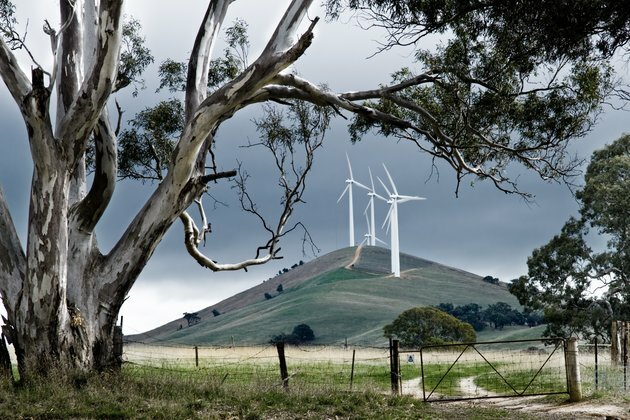The UK has a national climate change act why don't we
The Conversation
15 May 2019, 11:58 GMT+10

No matter who wins the upcoming federal election, both the ALP and LNP are committed to remaining in the Paris Climate Agreement.
This means every five years Australia is expected to submit progressively stronger targets to reduce greenhouse gas emissions, and report on progress. And by 2020, Australia is expected to submit a long-term emissions reduction strategy showing how to get to net zero emissions.
Regardless of what policy mix is chosen to achieve this, the process of hitting the Paris targets is now a permanent feature of economy-wide decision-making, one that will need credible ongoing support from government and businesses. Policy uncertainty, and a lack of national framework, has reduced investment confidence.
The UK has shown how national climate change legislation can guide institutional action, and not only dramatically cut emissions, but also promote economic growth.
Victoria rolled out similar legislation in 2017, one of the first pieces of legislation in the world to be modelled on the Paris Agreement.
But Australia lacks a national version of Victoria's or UK's legislation.
We have national targets, but not yet ongoing systems embedded in departments. These systems would include measures to ensure continuous target-setting every five years (as used in other jurisdictions) with guidelines and progress reporting obligations. A lack of national legislation means the community and businesses lack transparency about Australia's long-term direction, pace and progress.
How national climate change legislation would work
A national Climate Change Act would reduce recognise climate change was not taken into account when many current laws were developed, and reduce policy instability around Australian meeting our Paris obligations by:
providing a role for governments and courts to flesh out and stabilise the low carbon transition
guiding an emissions reductions path that looks ten years ahead, across all sectors of the economy, and that can be ratcheted up if policies fail to meet their targets
ensuring transparent reporting of emissions and progress towards meeting interim Paris Agreement targets
allocating responsibilities across government for reporting and climate-conscious planning
signalling to business, communities and government agencies about emerging opportunities in a low carbon economy.
How Victoria did it
In 2017, the Victorian Labor government rolled out state-wide climate legislation, the Victorian Climate Change Act.
This legislation recognises how addressing climate change needs a whole-of-government approach, extending obligations to each state government portfolio.
And it has already catalysed climate change reporting and planning activity across government. An independent committee has been tasked with advising on the first ten years of emissions budgets.
Government departments are preparing adaptation plans for each sector, reviewing operational guidelines and establishing regular reporting of emissions in sectors and their future plans.
The UK's success story
The UK passed its Climate Change Act in 2008 with a near unanimous vote. It has guided government decisions on national energy and industrial policy ever since.
The Act contains a process for setting economy-wide, multi-year targets, generating a clear, but flexible path towards its long-term objective - an 80% reduction in national greenhouse gas emissions by 2050. It's not explicit about how targets are to be met and successive governments have been free to choose their own mitigation policies.
What has resulted is a clear shift away from the politics of the past where climate change action was traded off against other government goals.
Ever since the Act passed, subsequent UK parliaments have created management and efficiency initiatives, a minimum price on carbon (called carbon price floors), renewable energy targets, competitive reverse auction schemes and capacity markets.
Combined, these policies promote a competitive, sustainable, low carbon energy supply, along with economic growth and increased national energy security.
And the results have been extraordinary: emissions in the UK have fallen dramatically since 2008, with the UK's carbon dioxide emissions now below 1860s levels.
National transparency would improve the market
With a clear legislative process with interim targets every five years, a Climate Change Act for Australia would provide businesses and the public with a certainty around the pace of climate change action that reaches beyond the political cycles.
Governments would still have the freedom to choose interim targets and how to deliver them, but the legislation would create transparency around our obligations.
It would also ensure that a transition to a low-carbon future does not risk financial stability.
Regulatory bodies, such as the Australian Prudential Regulation Authority, the Bank of England, and the Financial Stability Board, recognise the necessity for climate change legislation to create confidence in markets. They are already applying pressure to local and international financial markets to improve disclosure of climate risk.
Finally, national legislation would ensure the market and the public are kept up-to-date about progress and future pathways, and how they can be involved in the process along the way. This includes investing in Australia's potential as a new lower-carbon powerhouse.
Let's agree what is agreed, and move on
Australian politicians don't often agree on climate change action, but the major parties do agree on Australia staying in the Paris Agreement.
A national Climate Change Act for Australia would embody this commitment, aligning us with the international process in a policy-flexible framework. Agreement on such an Act would show the Australian public that each party is serious about tackling climate change, providing a stable platform for the next parliament.
 Share
Share
 Tweet
Tweet
 Share
Share
 Flip
Flip
 Email
Email
Watch latest videos
Subscribe and Follow
Get a daily dose of Paris Guardian news through our daily email, its complimentary and keeps you fully up to date with world and business news as well.
News RELEASES
Publish news of your business, community or sports group, personnel appointments, major event and more by submitting a news release to Paris Guardian.
More InformationInternational
SectionNew York fires 2,000 prison guards after wildcat strike
ALBANY, New York: New York fired over 2,000 prison guards this week for not returning to work after a weeks-long strike that disrupted...
China hits Canadian agriculture with tariffs in trade retaliation
BEIJING, China: China has announced new tariffs on Canadian agricultural and food products in retaliation for Canada's recent duties...
One dead, three injured as RV flips in Texas storm
ENNIS, Texas: A man died, and three of his family members were injured when their RV flipped several times during a strong storm at...
Man not the product of evolution, world-acclaimed naturalist argued
One halcyon spring day in 1903, the 69-year-old anatomist and naturalist Dr. James Bell Pettigrew sat at the top of a sloping street...
Fighter jets intercept plane near Trump’s Florida home
WEST PALM BEACH, Florida: Air Force fighter jets have stopped a civilian plane that entered restricted airspace near Donald Trump's...
US farmers face bankruptcy, economic uncertainty due to USDA freeze
CHICAGO/WASHINGTON, D.C.: Farmers and food groups across the U.S. are laying off workers, stopping investments, and struggling to get...
Business
SectionU.S. stocks rally hard despite drop in consumer sentiment
NEW YORK, New York - U.S. stocks rallied hard on Friday, boosted by strong rises around the world. Investors shrugged off a decline...
Maserati cancels electric MC20 plans over low demand
MILAN, Italy: Maserati has scrapped plans for an electric version of its MC20 sports car, citing low expected demand for the high-performance...
Volkswagen to slash 1,600 jobs at Cariad by year-end
BERLIN, Germany: Volkswagen is set to cut 1,600 jobs at its Cariad software division by the end of the year, affecting nearly 30 percent...
Travel to and from Israel to be boosted by terminal reopening
The principal terminal, Terminal 1, at Israel's largest airport will reopen at the end of this month, having largely been closed since...
Tech stocks lead renewed selling on Wall Street
NEW YORK, New York - The knee-jerk introduction of trade tariffs by President Donald Trump continues to rattle markets with all the...
Ford to invest up to $4.8 billion to revive struggling German unit
FRANKFURT, Germany: Ford announced this week that it will inject up to $4.8 billion into its struggling German unit to stabilize its...














